SEO keyword research is the cornerstone of any successful digital marketing strategy. Without the right keywords, even the most well-crafted content can remain hidden in the depths of search engine results. But what if there was a way to uncover the most effective keywords that could skyrocket your visibility?
In this ultimate guide, OctopusWriters breaks down the exact steps and insider tips you need to know. Whether you’re new to SEO or looking to refine your approach, our guide will empower you to dominate search rankings and stay ahead of the competition. Ready to explore the world of SEO keyword research? Keep reading to discover the game-changing strategies that can elevate your brand.
Understanding keyword research and its impact on SEO
Keyword research is the essential process of discovering and analyzing the search terms that people use in search engines. The data gathered from keyword research is primarily used for search engine optimization (SEO) or broader marketing strategies. By uncovering relevant queries, businesses can identify which keywords are most popular, how competitive they are, and the potential difficulty of ranking for them. This research forms the foundation for creating content that aligns with user intent, improves visibility, and enhances search engine rankings. In short, mastering keyword research is a crucial step in driving targeted traffic to your website and boosting your overall online presence.
Why is SEO keyword research essential?
SEO keyword research plays a vital role in finding the perfect balance between keywords that are both achievable to rank for and those where you can confidently create high-quality content. It’s not just about identifying popular search terms; it’s about understanding what your target audience is actively searching for on platforms like Google. According to OctopusWriters Growth Manager Amal Kalepp, “SEO keyword research helps you pinpoint who your competitors are and reveals the areas of the search landscape where your website has the potential to rank. Finding this ‘sweet spot’ is key to improving your rankability.”
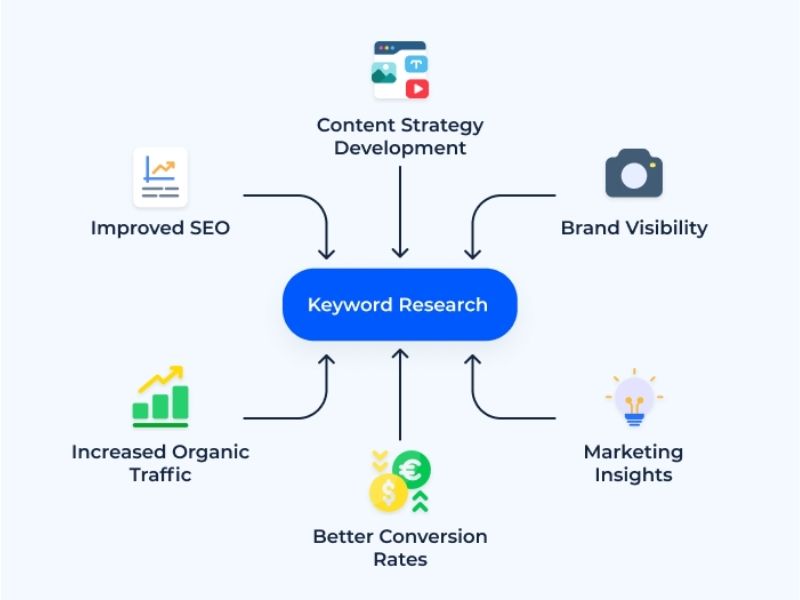
The insights gained from SEO keyword research are not only essential for fine-tuning your content strategy but also contribute to the broader scope of your marketing plan. For example, if your content strategy revolves around niche terms like “cat paranormal detective,” yet there’s no significant search volume for that keyword, it’s unlikely to bring in traffic or help you grow. By aligning your content with the keywords people are genuinely searching for, you can ensure that you attract the right audience.
Inbound marketing shifts the focus away from creating content based on what we want to tell people. Instead, the goal is to develop content that provides the answers your audience is already seeking. The process begins with effective SEO keyword research, allowing you to create meaningful content that resonates with search intent.
Benefits of SEO keyword research
Conducting SEO keyword research offers numerous advantages, including:
- Marketing Trend Insight: Effective keyword research reveals current trends and helps you craft content around topics that your audience is already interested in.
- Traffic Growth: The better your keyword strategy, the higher your chances of ranking in search engine results, ultimately driving more visitors to your site.
- Customer Acquisition: Targeting the right keywords allows your content to meet user needs, which, paired with strong calls to action, can guide users through the buyer’s journey from awareness to conversion.
By analyzing keyword popularity, search volume, and intent, you can tackle the questions most relevant to your audience. For instance, instead of focusing on narrow keywords with low search volume, the Purranormal Detective Agency could shift its strategy toward producing content on broader terms like “paranormal investigators,” which has a more significant monthly search volume (MSV).
Keywords vs. topics
A crucial factor in SEO keyword research is understanding search intent — why users are entering a specific keyword. OctopusWriters’ SEO experts frequently emphasize that the intent behind a search is just as important as the keyword itself. Content needs to address the users’ problems, and that starts by anticipating the questions tied to specific search terms like “SEO keyword strategy” and delivering clear answers.
Though SEO is rapidly evolving, SEO keyword research remains a cornerstone of understanding search intent. By focusing on high-volume keywords, you can categorize your content into broader topics or buckets, which serve as the foundation for your SEO strategy. These topics then guide you in selecting the best keywords to target, ensuring your content addresses the needs of your audience while improving your search visibility.
Key elements of SEO keyword research you need to master
Successful SEO keyword research relies on three essential elements: relevance, authority, and volume. These factors help ensure that your content aligns with what users are searching for, your website gains credibility, and you attract valuable traffic.
Relevance
Search engines like Google rank content based on how relevant it is to the user’s intent. For your content to rank for a keyword, it must effectively meet the searcher’s needs and provide greater value than competing content. For example, if you’re running an SEO business targeting small businesses, you might think that “SEO tips for small businesses” is the most relevant keyword. However, data from keyword research tools, such as Ahrefs, may reveal that “small business SEO” has higher monthly search volume (MSV) but comes with tougher competition. This makes choosing the right keywords crucial for relevance and ranking potential.
Authority
Google rewards websites it views as authoritative. To become an authority in your niche, you must regularly publish high-quality, informative content that resonates with your audience. Gaining backlinks from other reputable sites and promoting your content across platforms like social media can also boost your authority. However, competing with well-established sources such as Forbes or The Mayo Clinic may lower your chances of ranking, so focus on building your authority in areas where you can stand out.
Volume
The final critical element in SEO keyword research is search volume. Even if you manage to rank for a specific keyword, it won’t generate traffic unless that keyword is frequently searched. Search volume, measured as MSV (monthly search volume), represents how many times a keyword is searched each month. For instance, while “cat detective agency” might be a fun and unique concept, it has little to no search volume, making it ineffective for driving traffic. On the other hand, a broader term like “paranormal investigator” might not have a massive search volume, but it is still a more viable keyword for attracting visitors.

One common mistake in SEO keyword research is assuming that higher MSV is always better. OctopusWriters Growth Manager Amal Kalepp explains, “While a keyword like ‘Instagram marketing’ has millions of searches, it’s incredibly competitive and difficult to rank for. You might see more success targeting a niche keyword like ‘Instagram marketing for small businesses,’ which has lower MSV but is easier to rank for.”
In short, when conducting SEO keyword research, balancing relevance, authority, and volume is key to finding the sweet spot where your content can shine and attract the right audience.
How to effectively research keywords for your SEO strategy
Conducting SEO keyword research is crucial for building a successful content strategy that targets the right search terms. In this guide, I’ll walk you through a structured process to help you develop a powerful list of keywords that will boost your online visibility and drive relevant traffic to your website. With these steps, you’ll be able to create a robust keyword strategy that aligns with your business goals and meets the needs of your target audience.
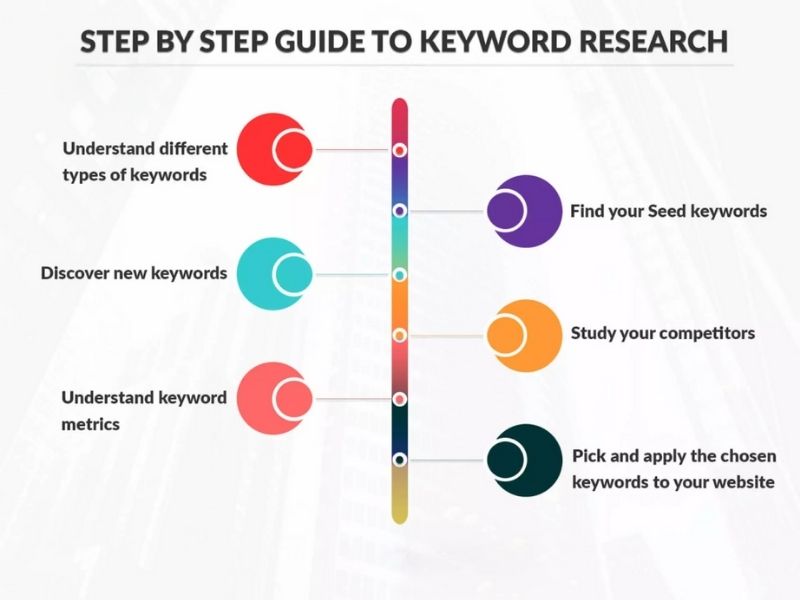
Step 1. Create a list of relevant topics based on your business
Begin your SEO keyword research by identifying the main topics that are most relevant to your business. Think of these as broad categories or “buckets” that encompass what your business offers. Typically, these buckets are based on what you know your target audience searches for, the products or services you provide, and the topics that are frequently discussed in your blog or sales conversations.
For instance, if you run an inbound marketing firm, your buckets might include topics like “SEO,” “social media marketing,” “email marketing,” and “lead generation.” Assign monthly search volume (MSV) data to these buckets to gauge their relevance and popularity. For example, OctopusWriters might identify the following topics:
- SEO (201K MSV)
- Blogging (60.5K MSV)
- CRM software (49.5K MSV)
- Social media marketing (405K MSV)
These buckets give you an idea of the general areas your audience is interested in. Once you have your main topics, the next step is to dive deeper into each one.
Step 2. Expand each topic bucket with specific keywords
With your topic buckets in hand, it’s time to generate specific keyword phrases that fit into each one. This step is essential in SEO keyword research because it narrows down the actual terms your target audience is searching for. Think of the phrases that potential customers are likely to use when they’re looking for content related to your business.
For example, for the bucket “marketing automation,” you might brainstorm keywords like:
- AI marketing tools
- Best marketing automation software
- How to implement marketing automation
- Lead nurturing strategies
At this stage, the goal isn’t to finalize your keyword list but to collect as many ideas as possible. You can refine this list later based on factors like search volume and keyword difficulty.
Additionally, tools like Google Analytics and Google Search Console can help you see which keywords are already driving traffic to your website. This data is invaluable as it highlights what’s already working and where there’s room for improvement.
Step 3. Analyze keyword search intent and competition
Once you’ve identified relevant keywords for each bucket, it’s time to evaluate the search intent behind those terms. Google ranks content not just on relevance but also on whether it satisfies the user’s search intent. For example, someone searching for “how to use marketing automation” likely wants a guide or tutorial, whereas “best AI marketing tools” might imply they are looking for product recommendations.
It’s important to ensure that the content you plan to create matches the intent behind each keyword. Moreover, analyze the competition for each keyword—if high-authority websites like Forbes dominate the results, it may be better to focus on less competitive keywords where your site has a better chance of ranking.
Step 4. Explore related search terms
A useful strategy in SEO keyword research is to investigate related search terms. When you search for a keyword in Google, related searches appear at the bottom of the results page. These can spark additional keyword ideas that you might not have initially considered.
For instance, a search for “AI marketing tools” might reveal related searches like “best AI marketing tools” or “AI tools for small businesses.” These variations can provide further opportunities to diversify your keyword list. You can even explore the related searches of related searches to uncover hidden gems that could enhance your SEO efforts.
By following these steps, you can effectively conduct SEO keyword research and build a targeted, data-driven strategy that helps your business rank higher in search engine results. With a strong foundation in keyword research, your content will be more likely to attract the right audience, drive organic traffic, and ultimately lead to business growth. Remember, keyword research is not a one-time task—it should be revisited regularly to adapt to changing trends and audience behavior.
How to effectively choose keywords for your SEO strategy
Once you’ve identified potential keywords, the next step in your SEO keyword research journey is refining your list to focus on the most strategic terms. Here’s a step-by-step guide to help you choose the best keywords that will drive traffic and support your overall SEO strategy.
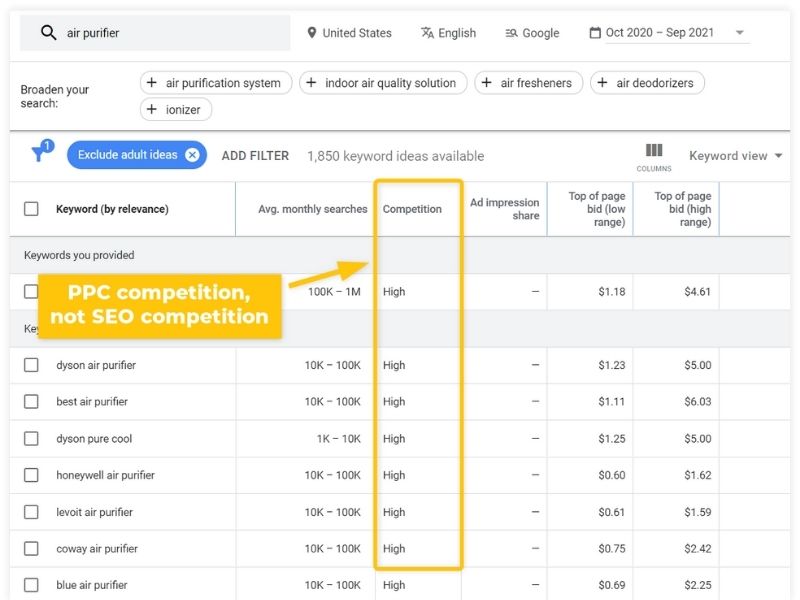
Step 1. Use Google Keyword Planner to refine your list
To begin narrowing down your keyword list, turn to tools like Google Keyword Planner. This tool allows you to evaluate search volume and traffic estimates for the keywords you’re considering. Flag terms with very low or excessively high search volumes, as these may not fit your SEO goals.
However, don’t eliminate them right away. Use Google Trends to assess whether any low-volume keywords have the potential to grow in popularity, making them valuable in the long run. If your list feels overwhelming, Google Trends can also help you identify trending terms that deserve more focus in your SEO keyword research.
Step 2. Prioritize low-hanging fruit
When refining your SEO keyword research, focus on keywords that you have a realistic chance of ranking for, especially based on your website’s current authority. Larger companies often dominate high-volume, competitive keywords, but there are opportunities with low-competition keywords.
Look for keywords with lower competition that can still bring in traffic. These are your “low-hanging fruit” — terms that can be easier to rank for because fewer competitors are targeting them.
Step 3. Check monthly search volume (MSV)
Another important part of SEO keyword research is reviewing the monthly search volume (MSV) of your keywords. This data reveals how often a term is searched per month and helps ensure you’re creating content people are actively looking for. For example, a keyword like “SEO keyword strategy” might have an MSV of 400, making it a useful term for targeted content.
Free tools like Google Trends or searchvolume.io can help you discover the search volume for keywords or related clusters, allowing you to select the best-fit terms for your content strategy.
Step 4. Consider SERP features when selecting keywords
Search Engine Results Pages (SERP) offer various features that can boost visibility if utilized correctly. During your SEO keyword research, take note of the SERP features associated with the keywords you want to target. These can include:
- Image packs: If there’s an image pack for a keyword, consider creating image-heavy content to improve your chances of appearing in this feature.
- AI overviews: Recent AI-generated summaries may appear for certain searches, so optimize your content to provide concise and relevant information.
- Featured snippets: These short, informative snippets often answer questions directly and can help your content secure a top spot.
- List snippets: Keywords that match “how-to” queries often lead to list snippets, making structured content ideal for winning this position.
- Video snippets: Videos that answer common search queries have a chance of being displayed in video snippets, so consider adding relevant video content to your site.
Understanding and leveraging SERP features can enhance your SEO efforts and drive additional traffic.
Step 5. Balance head terms and long-tail keywords
To develop a comprehensive SEO keyword research strategy, ensure you have a good mix of head terms (short, generic phrases) and long-tail keywords (more specific, longer phrases). While head terms may have higher search volumes, they are also more competitive. Long-tail keywords, though less searched, often bring in more targeted, qualified traffic, leading to faster wins.
For example, “blogging” is a high-volume head term that will be harder to rank for. In contrast, “how to write a great blog post” is a long-tail keyword that’s easier to target and typically attracts users further along in the buyer’s journey.
Step 6. Analyze competitor keyword rankings
Finally, check how your competitors are ranking for the keywords on your list. Just because a competitor ranks for a specific keyword doesn’t mean it’s vital for your strategy. However, understanding which keywords they prioritize can help you evaluate your own list and find opportunities where you can outperform them.
Don’t overlook keywords your competitors aren’t targeting. These could provide opportunities for you to capture untapped traffic and build authority in those areas. Tools like SEMrush or manually searching in an incognito browser can give you insights into your competitors’ keyword positions.
Effective SEO keyword research involves balancing search volume, competition, and keyword intent to develop a well-rounded strategy that helps your website gain visibility and authority.
Advanced SEO keyword research tips to boost your strategy
If you’re confident with the basics of SEO keyword research, it’s time to dive into more advanced techniques to give your strategy an edge. These tips will help you refine your approach, allowing you to stay ahead of the competition and improve your search rankings.
Find and use semantic keywords
A key aspect of advanced SEO keyword research is the use of semantic keywords—terms and phrases that are conceptually related to your main topic. These aren’t necessarily the keywords users are actively searching for but are words that search engines expect to see within your content. Including semantic keywords ensures your content is comprehensive and relevant, signaling to search engines that your piece fully covers the topic.
For example, if you’re writing a guide about feeding dogs, semantic keywords might include terms like “healthy weight,” “portion size,” and “senior dogs.” Failing to incorporate such terms may suggest to search engines that your content is incomplete, affecting your ranking potential.
To identify semantically related keywords, analyze the top-ranking results for your primary keywords and see what additional terms they include. This can enhance your content’s relevance and give you a competitive advantage.
Anticipate keyword trends
Staying ahead in SEO keyword research means anticipating trends before your competitors do. One of the best tools for this is Google Trends, which allows you to monitor search terms that are gaining popularity over time.
For instance, when exploring the topic of “dog food,” Google Trends’ “Related queries” section highlights keywords with the biggest spikes in search frequency. Some may even show a “Breakout” status, indicating a surge of over 5,000%. By quickly producing content around these rising terms, you can capture valuable rankings before your competitors realize the trend is happening.
In addition to Google Trends, you can stay ahead by:
- Keeping up with industry news
- Monitoring social media conversations in relevant communities
- Engaging with your customers directly to understand their emerging needs
By using these strategies, you can anticipate upcoming trends and adjust your SEO keyword research to align with evolving user interests.
Asking questions is essential for successful keyword research
Before diving into SEO keyword research, it’s crucial to ask the right questions. This helps you truly understand the business, its customers, and its goals. Skipping this step is a common mistake that can lead to keyword strategies that miss the mark. What you think you want to rank for may not align with what your audience is actually searching for. By focusing on your audience first and then using keyword data to refine your approach, you’ll create far more effective SEO campaigns.
For example, consider a local business like Frankie & Jo’s, a vegan and gluten-free ice cream shop in Seattle. Before starting their SEO keyword research, it’s essential to understand who their customers are and what kind of content they are searching for. Questions to ask could include:
- What desserts or snacks are people searching for?
- Who is looking for these terms?
- What search terms do they use?
- Are there seasonal trends in ice cream searches?
- Are customers looking for health-conscious options, or are they satisfying a sweet tooth?
Understanding these elements shapes the direction of your keyword research and content strategy, ensuring you target the terms most relevant to your audience.
What terms are people searching for?
It’s important to consider how your audience is searching for the products or services you offer. Even if you have a specific way of describing your offerings, your customers might be using entirely different terms. That’s why SEO keyword research begins by identifying the exact words and phrases potential customers are using.
Start with seed keywords that describe your products or services, and use keyword research tools to discover related terms. For instance, a wedding florist might start with terms like “wedding flowers” or “bridal bouquets.” Research will uncover additional relevant keywords like “wedding flower shop” or “wedding flower arrangements.” By understanding which variations are more commonly searched, you can prioritize the terms most likely to drive traffic to your website.
Getting strategic with competitors, seasons, and regions
To further refine your SEO keyword research, it’s important to analyze search volume in the context of your competitors, seasonal trends, and geographic location. If you find keywords your competitors aren’t targeting, that’s an opportunity to gain an edge. Alternatively, you could target the same high-volume keywords your competitors rank for, but be prepared for a tougher fight for those rankings.
Additionally, consider seasonal variations in search terms. A florist might see a spike in “Christmas floral arrangements” searches in November and December, which would require preparing content ahead of time. Geographical keyword variations are also key—understanding that “big rig” is common in Texas, while “tractor-trailer” is used in New York, can make your content more locally relevant.
Understanding search intent
Lastly, an integral part of SEO keyword research is understanding the searcher’s intent. This refers to why the user is searching for a particular term—are they looking for information, ready to make a purchase, or comparing products? Google’s algorithms analyze search intent to determine the most relevant content for each query.
Different search intents fall into categories like informational, transactional, or local. By analyzing the SERP features (like shopping carousels, knowledge panels, or local packs), you can determine what kind of content will resonate most with searchers. For example, if you’re targeting a keyword like “dresses,” the presence of a shopping carousel suggests that users are likely shopping for dresses, meaning your content should cater to that intent.
Best Keywords for SEO
There’s no such thing as the “best” keywords—only the ones that are most relevant and highly searched by your target audience. The effectiveness of a keyword depends on how well it aligns with your business goals and the search intent of your users. Therefore, crafting a successful SEO strategy involves selecting keywords that account for three critical factors: relevance, authority, and search volume.
To choose the right keywords, you must target terms that not only attract a substantial number of searches but are also terms where you can realistically compete. This means considering the strength of your competitors and your ability to produce high-quality content that adds value to the topic.
Top 14 SEO keyword research tool free
When conducting SEO keyword research, having the right tools at your disposal can make all the difference. Here are some of the best free tools that can help you generate keyword ideas, assess search volume, and better understand search intent.
Keyword Generator
The Keyword Generator provides up to 150 keyword ideas for a broad topic. Simply input a topic, select your target country, and click “Find keywords.” For instance, if you search for “bitcoin,” you’ll get a list of the 100 most popular related keywords and 50 common questions people are searching for. It also displays Keyword Difficulty (KD) scores, helping you gauge the competitiveness of each term.
Answer The Public
Answer The Public uses autocomplete to discover questions that people are searching for online. Just input a broad topic, select a country, and hit “search.” For example, a search for “bitcoin” will generate hundreds of keyword ideas categorized into different groups, although it doesn’t provide search volumes. The tool’s visualizations help you understand the types of queries users are asking.
ChatGPT
While ChatGPT isn’t a dedicated keyword research tool, it can be useful for generating seed keyword ideas. By asking the chatbot for keywords related to a topic like Bitcoin, you can uncover terms you might not have initially considered. You can then plug those seeds into other tools to expand your research.
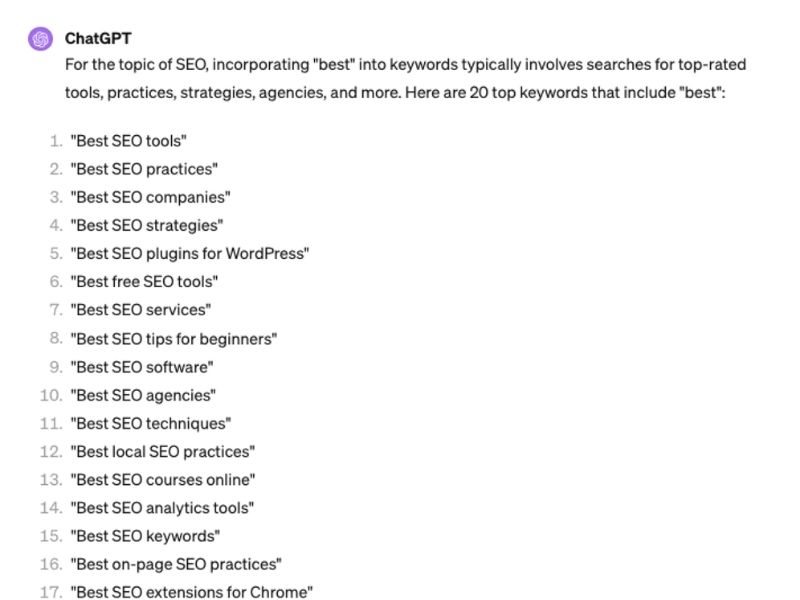
Ahrefs Webmaster Tools
With Ahrefs Webmaster Tools, you can see all the keywords your website currently ranks for in the top 100 search results. By focusing on low-hanging fruit, such as keywords ranking in positions 11-20, you can identify terms that may be easier to push onto the first page and drive significant traffic boosts.
Google Keyword Planner
Originally built for advertisers, Google Keyword Planner is also a valuable tool for SEO keyword research. It helps you find related keywords, even those that don’t contain your seed term. For example, searching for “crypto” might return related ideas like “cold wallet” and “hardware wallet.” While it only provides search volume ranges, it’s still a useful starting point for finding potential keywords.
Google Search Console
Google Search Console allows you to see how your site performs for its top 1,000 keywords. One of the best uses for keyword research is identifying declining keywords. By addressing these declining queries through content updates or adjustments, you can recapture lost traffic.
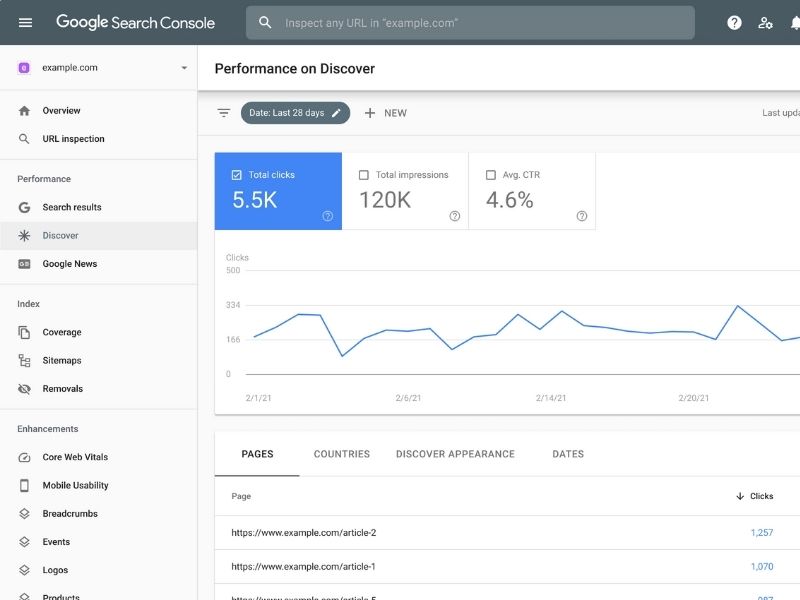
Google Trends
Google Trends visualizes the popularity of a keyword over time, helping you identify trending topics. For instance, a search for “AI content” shows a significant spike recently, allowing you to capitalize on rising topics before they saturate other tools.
SERP Checker
SERP Checker helps you analyze the top-ranking pages for a given keyword and provides metrics to assess the traffic potential of those pages. This tool is particularly useful for understanding the true value of ranking for a keyword, as top-ranking pages often attract traffic from multiple related terms.
Keyword Difficulty Checker
The Keyword Difficulty Checker estimates how challenging it will be to rank for a keyword based on the number of backlinks required. While high KD scores indicate tougher competition, lower KD scores can help you identify easier keywords to target.
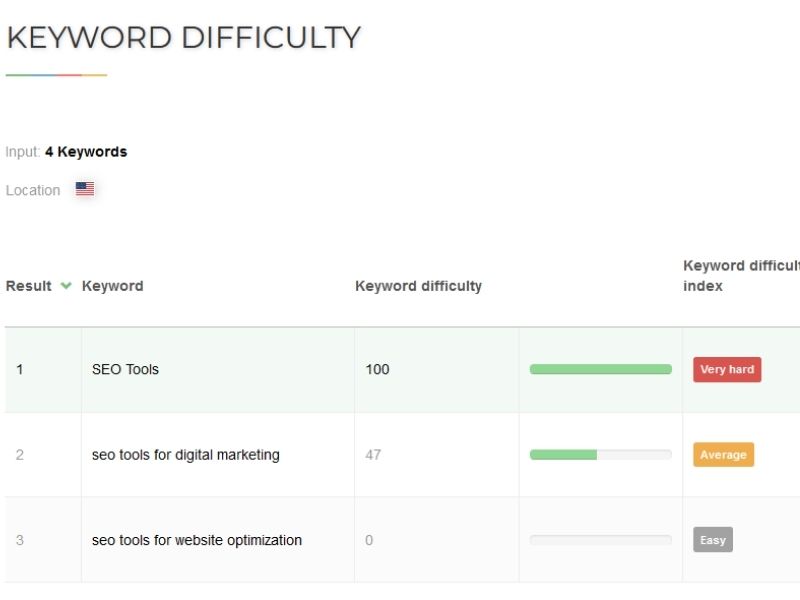
Google Gemini
Google Gemini, an AI assistant similar to ChatGPT, can help you understand search intent by analyzing Google search results. By pulling titles from the top results, Gemini can summarize what users are looking for when they search a keyword, offering insights into how you should structure your content.
SEO.com
SEO.com is a highly effective free keyword research tool that can significantly reduce the time spent on SEO tasks. It offers essential features like keyword research, traffic analysis, site audits, and competitor research, making it easier to improve your rankings faster than your competitors.
Pros:
- Streamlines SEO tasks and saves time
- Budget-friendly with essential SEO tools
- Provides actionable insights and competitor monitoring
- Tracks website traffic, keyword rankings, and other performance metrics
- Free plan available with no credit card required for risk-free access
Semrush
Semrush is a comprehensive all-in-one digital marketing platform. It provides a wide range of tools, including keyword research, site audits, backlink analysis, and competitive research, helping businesses enhance their online visibility and marketing strategies.

Pros:
- Complete suite for digital marketing, covering SEO, advertising, and more
- Offers in-depth keyword research, SEO audits, and competitor insights
- Large keyword database with tracking options
- Regularly updated tools to meet evolving digital marketing needs
Cons:
- Can be too expensive for small businesses or individual users
- Steeper learning curve for new users due to the platform’s depth
Keywords Everywhere
Keywords Everywhere is an affordable browser extension that provides keyword data, including search volume and cost-per-click (CPC), directly in search engine results and other platforms like YouTube and Google Search Console.
Pros:
- Shows keyword data across multiple platforms, including YouTube
- Displays useful keyword insights directly in search results
- Offers cost-effective pricing for basic SEO needs
Cons:
- Data accuracy may be lower compared to premium SEO tools
- Fewer features than more comprehensive tools like Ahrefs or Semrush
Moz Keyword Explorer
Moz Keyword Explorer is a powerful tool for discovering and analyzing keywords to optimize SEO strategies. It offers valuable data such as search volume, keyword difficulty, and competitive analysis to help businesses improve their online presence.
Pros:
- Provides detailed keyword metrics, including opportunity scores
- Offers competitor analysis insights and SERP opportunities
- Access to a full SEO software suite with additional features
These tools can enhance your SEO keyword research by offering various features tailored to different needs and budgets, whether you’re looking for free, affordable, or more advanced solutions.
SEO Keyword Research – Frequently Asked Questions
What are keywords?
Keywords are specific words or phrases that users type into search engines to find information, products, or services. In SEO, these keywords help websites target relevant queries to rank higher in search results.
What is the purpose of a keyword research tool?
A keyword research tool helps identify popular search terms, analyze keyword competition, and assess search volume. It provides insights into which keywords are worth targeting for SEO or content strategies.
Which keyword research tool provides the most accurate data?
Tools like Ahrefs, Semrush, and Moz are known for providing reliable and comprehensive keyword data, including search volume, keyword difficulty, and competition analysis.
How can I choose the right keyword research tool for my needs?
Choosing the best tool depends on your goals and budget. If you’re looking for a free solution, options like Google Keyword Planner are useful. For more in-depth data, paid tools like Ahrefs or Semrush offer advanced features.
How do I use a keyword research tool to find effective keywords?
To find the best keywords, enter a broad term related to your business into the tool. Look for keywords with a good balance of high search volume and manageable competition. Consider long-tail keywords for more targeted results.
What’s the difference between short-tail and long-tail keywords?
Short-tail keywords are broad, general terms (e.g., “shoes”), while long-tail keywords are more specific phrases (e.g., “best running shoes for women”). Long-tail keywords often have lower competition and higher conversion potential.
Can free keyword research tools provide reliable data?
Yes, free tools like Google Keyword Planner and Answer The Public can offer valuable insights, especially for basic keyword research. However, premium tools tend to provide more accurate and detailed data.
How do search trends impact keyword research?
Search trends can reveal seasonal or emerging keywords that might be worth targeting. Tools like Google Trends can help you identify keywords that are gaining popularity over time.
Should I target high-volume keywords only?
Not necessarily. While high-volume keywords can drive traffic, they are often highly competitive. A mix of high-volume and long-tail keywords can help you capture both broad and niche audiences.
How often should I perform keyword research?
It’s good practice to revisit your keyword research regularly, at least quarterly, to stay on top of changing search trends, emerging keywords, and new competition.
Conclusion
Effective SEO keyword research is the foundation of any successful digital marketing strategy. By using the right tools and focusing on keywords that balance relevance, search volume, and competition, you can significantly improve your search engine rankings and drive more traffic to your site.
At OctopusWriters, we believe that understanding your audience’s needs and aligning them with strategic keywords is key to long-term success. Whether you’re just starting or looking to refine your approach, mastering SEO keyword research will give you the competitive edge you need to stay ahead in the digital landscape.

